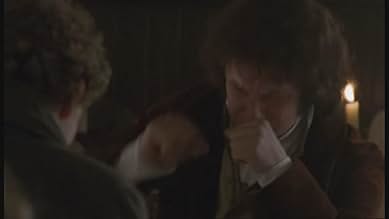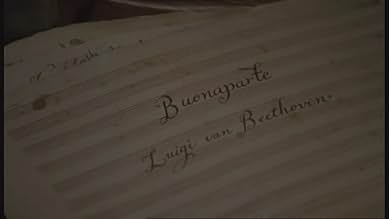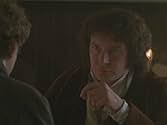On June 9, 1804, Ludwig van Beethoven and his pupil Ries assemble a group of musicians to give the first performance of his Third Symphony, 'Bonaparte', to his patron Prince Lobkowitz and hi... Read allOn June 9, 1804, Ludwig van Beethoven and his pupil Ries assemble a group of musicians to give the first performance of his Third Symphony, 'Bonaparte', to his patron Prince Lobkowitz and his guests, including hypercritical Count Dietrichstein, in Vienna. The piece provokes polit... Read allOn June 9, 1804, Ludwig van Beethoven and his pupil Ries assemble a group of musicians to give the first performance of his Third Symphony, 'Bonaparte', to his patron Prince Lobkowitz and his guests, including hypercritical Count Dietrichstein, in Vienna. The piece provokes political arguments among players and audience as to whether Bonaparte is a tyrant, or, as Beet... Read all
- Director
- Writer
- All cast & crew
- Production, box office & more at IMDbPro
Featured reviews
The events of Beethoven's life seem compressed and shoveled into the 90 minutes of the film. We see how he deals with large issues like Napeoleonic politics, patronage, love, and hearing loss, as well as smaller issues like arranging music and the most efficient means of belittling his assistant.
What I found fascinating was being able to see how the characters of the period responded to the music as it was being played. I have a distant knowledge of Beethoven's works, and while they are certainly powerful and turbulent, I lack the context of the music of the era. Seeing the patrons react to various passages of the music (which to my untrained ear just sounds pretty) and hearing them comment on the work as it progressed was for me highly illuminating.
What a thrill it would be to be able to walk around an orchestra as it plays! That would be the ultimate in surround sound! I was jealous of the characters as they mingled around the players, who from what I can tell were using period-correct instruments.
I have had the great honor of performing this masterpiece when I was a student at Duquesne University, so it's always like coming home when I hear this piece. This film gave me an opportunity to visit it with fresh eyes and ears.
One thing I have to complain about is the usual one, the violas nearly always get short shrift when orchestras are filmed, but this is a small oversight in view of the entire movie.
Well done!
Much of the 'action' revolves around the audience of this magical performance. If only the Director had resisted the temptation to spin round the viewers as they watched! The film certainly flew by, but I was left wishing that this was only the start of the film and not the totality.
The movie is very good looking and fun from start to finish. The appearance of Haydn and his utterances about the new symphony are perfect, according to what we know about his personality.
My favorites for this work have been Klemperer on EMI and Hogwood on Archiv, but I now prefer this performance over them all (including Bruno Walter's).
Easily the best movie about Beethoven that I have seen.
Did you know
- TriviaThe white muslin dress with yellow overdress worn by the farmhouse servant is the same costume Kate Winslet (Marianne Dashwood) wears during the picnic scene in Sense and Sensibility (1995), and Michelle Ryan wears during the scene in which Sir Thomas asks Maria if she wants to marry Mr. Rushworth in Mansfield Park (2007).
- GoofsBeethoven's assistant was Ferdinand Ries, pronounced "Reese." The name was pronounced correctly in the film but incorrectly spelled "Reis" in the film credits. It was Ries himself who told the story of his incorrectly thinking the horn player came in early.
- Quotes
Princess Lobkowitz: [speaking about the Eroica Symphony] Unusual, though, wasn't it?
Josef Haydn: Unusual? He's done something no composer has ever done. He's placed himself at the center of his work. He gives us a glimpse into his soul. I expect that's why it is so noisy. But it is something quite new. Quite new. The artist as hero. Everything is different from today.
- SoundtracksEine Kleine Nachtmusik
(excerpt)
Music by Wolfgang Amadeus Mozart
Played by Orchestre Révolutionnaire et Romantique
Conducted by John Eliot Gardiner
Details
- Release date
- Country of origin
- Official site
- Language
- Also known as
- Eroica - The Day That Changed Music Forever
- Filming locations
- Production company
- See more company credits at IMDbPro
Contribute to this page































